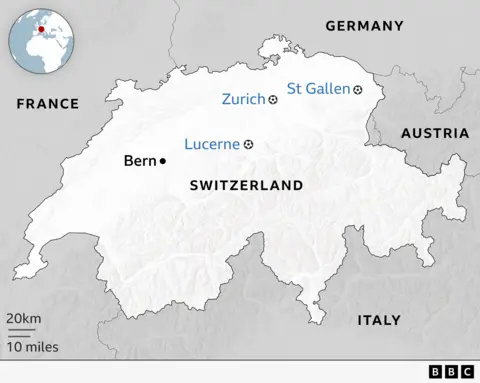Get me to the Euros! How to nab last-minute tickets for a summer of football
 BBC
BBCEuro 2025 is here, filling our summer with fierce competition and fantastic football.
Sixteen teams are set to play across eight venues in Switzerland from 2 to 27 July. In the group stages, defending champions England take on Wales - who are playing in their first international tournament.
Tickets are still available for a range of matches and there's a host of activities outside the games - including fan zones in Switzerland and the UK.
If you fancy a last-minute trip or want to watch the games at home, here's a complete guide to all the action.
Can I still get tickets?

Yes, but secure your spot quickly.
Tickets for high-demand matches go on sale daily at 10:00 BST via UEFA's ticketing site, with a limit of 10 tickets per person per game. Prices start at 25 CHF (about £22) and go up to 90 CHF (about £81) for the final.
You can access your tickets via the UEFA Mobile Tickets app, which can be downloaded for free by Android and iPhone users. There's also a resale platform where fans can safely resell any tickets purchased - but it's best not to rely on this for the big games.
Where in Switzerland?

The tournament takes place across eight Swiss cities: Basel, Bern, Geneva, Zurich, St Gallen, Lucerne, Sion, and Thun.
The games started in Thun on Wednesday 2 July with Finland beating Iceland 1-0. Expect a breathtaking backdrop of idyllic lakes and mountains as the action continues.
England matches in the group stages are being held across two cities - Zurich and St Gallen. The Lionesses face France in Zurich on Saturday 5 July and the Netherlands in Zurich on Wednesday 9 July.
Then we're off to St Gallen for the crunch England v Wales match on Sunday 13 July.
Wales' first game is in Lucerne against the Netherlands on Saturday 5 July, followed by their second game against France in St. Gallen on Wednesday 9 July.

How do I get there?

Zurich is the best destination for England and Wales fans heading to the games in the group stages because Lucerne and St Gallen are a short train ride away. However, there's also the option of going to Bern or Geneva and travelling on from there.
Flights to Zurich vary greatly depending on when you book and the time of travel. From London to Zurich, expect the most direct one-way flights to be in the ballpark of £100 to £200. Of course, there are cheaper deals involving lengthy transfers. From Cardiff to Zurich, most journeys involve a transfer and prices are typically higher at about £200 to £300.
There has already been some disruption with fans experiencing flight changes or cancellations due to strikes by French air traffic controllers. Ryanair was one of the airlines that announced mass cancellations, with more than 400 flights affected. EasyJet said it was cancelling 274 flights on Thursday 3 July and Friday 4 July. If you plan on flying, double check that your route is still viable.
In the car, it's about an 11-hour drive from London to Zurich. The car ferry from Dover to Calais for a last-minute booking one-way starts at about £90 and goes up to about £150. If you take the Eurotunnel from Folkestone to Calais, prices range from about £160 to £310 for a last-minute trip.
Trains from London to Zurich, typically via Paris or Brussels, cost about £400 to £550 over the next week. The journey take between seven-and-a-half and 10 hours. Coaches are cheaper, with some routes starting at about £100. But the journey takes more than 20 hours.
A very long bike ride from London to Zurich takes roughly 52 to 60 hours. It costs about £30 to take your bike on the ferry, not counting the toll it will take on your legs.
British citizens can travel to Switzerland without a visa for up to 90 days in any 180-day period if the visit is for tourism and sporting events. But double check that the expiry date on your passport is dated at least three months after the day you plan to leave.
Where do I stay?

Switzerland is known for being a pricey holiday pick. But there's a range of accommodation options for different budgets.
As one of the tournament's main hubs, Zurich is in high demand. Hotels for two people for one night start at about £200 to £400 on key match days like Saturday 5 July or Wednesday 9 July. If you're on a tighter budget, Airbnbs are available for between £90 to £200 for the same dates, although lots of options involve staying in a room rather than renting a whole flat.
In St Gallen, hotels for Sunday 13 July range from about £100 to £600. Lots of places are already booked up. The town also offers a variety of Airbnb accommodation at similar prices - starting at about £100 and going up to £600 to £700 for two guests for one night.
If hotels and Airbnbs stretch your budget, camping is one alternative. Campsites near Zurich and St Gallen offer scenic views and you could look into renting a car or bike to get around. The average cost for an overnight stay at a Swiss campsite is about £20 - £35, though prices vary between locations.
How do I get around?

Switzerland has good public transport networks, with fast and reliable services between major cities. On match days, public transport is free for ticket holders. Every ticket will be valid on the match day for a second-class round trip between any Swiss locality and the stadium.
Switzerland's vast network of trains offer an efficient and scenic way to travel. The SBB (Swiss Federal Railways) has a range of different tickets on their website. There's also PostBus, a bus service connecting rural areas to urban centres, which offers hundreds of journeys via several apps or you can purchase tickets from stations and drivers.
If you're planning on staying for a longer break, a Swiss Travel Pass offers unlimited travel by train, bus and boat, and is available for three, four, six, eight or 15 consecutive days.
Then, there's the more adventurous option of taking one of the many iconic cycle routes across Switzerland.
Where do I find fan zones?

City centre fan zones are set up across the eight cities hosting Euro 2025 games. Organisers say they offer a "packed schedule of activities for all ages" with live screenings of matches, concerts, workshops and child-friendly football pitches.
In Zurich, the ZüriFanzone is right by the main station – with screenings of all the matches, concerts, and workshops. In St. Gallen, Marktgasse in the old town is hosting the fan zone with lunchtime panel talks, street football and live music. In Lucerne, the fan zone is located at Europaplatz next to Lake Lucerne and offers a range of music, concerts and football entertainment.
Fan zones opened on 2 July, the day of the first game. Double check their closing dates on the UEFA event guides.
 Getty Images
Getty ImagesAnything else I should know?

The Swiss Franc (CHF) is the official currency in Switzerland. For every pound, it's roughly 1.10 Swiss Francs. In most cases, you can also pay in Euros. A pound is worth roughly €1.17.
Switzerland has four official languages: German, French, Italian and Romansh. German is the most widely spoken but English is a common second language for many Swiss people.
Switzerland is not part of the EU so mobile roaming charges could differ from rates in European countries. Check with your network provider before you travel. One solution is buying a local eSIM to cover you for the tournament.
Where to watch in the UK?

For fans at home there are events taking place across England and Wales.
There are watch parties of each England match in the group stages in Birmingham, London, Nottingham and Brighton.
In Wales, there are also lots of watch parties and concerts, including in Swansea, Newport and Wrexham.
Look out for events on social media in your local area as the tournament goes on.
How can I watch the games from home?

Every match in the UK will be shown either on BBC or ITV, with the final available on both channels.
There will be live coverage of 16 matches on BBC One, BBC Two and iPlayer with Gabby Logan, Alex Scott and Jeanette Kwakye presenting across the tournament. This includes Wales v Netherlands and England v Netherlands on BBC One. France v England, France v Wales and England v Wales will be on ITV.
On Radio, there will be 25 live match commentaries on Radio 5 Live, Radio 5 Sports Extra and BBC Sounds across the tournament. BBC Radio Wales and BBC Radio Cymru are covering Wales' games, providing commentary in English and Welsh.
The BBC Sport website, app and social media is covering every moment with live match reports, clips, highlights, interviews and analysis.
And there are lots of podcasts to help you get your football fix including Football Daily, featuring interviews with players and managers, and Feast of Football, bringing you all the latest news from Euro 2025.
